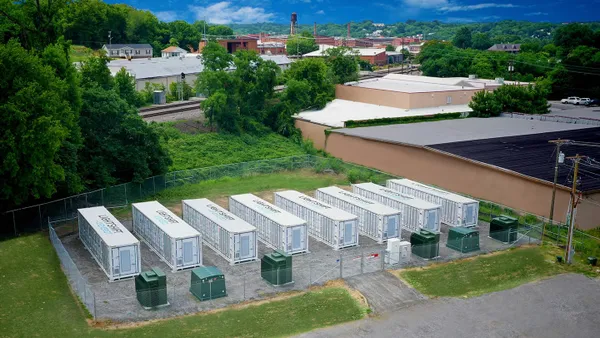Dive Brief:
- Utilities and clean energy groups are urging the California Public Utilities Commission (CPUC) to move quickly to address the state's reliability changes in the wake of an emergency proclamation from California Gov. Gavin Newsom, D, to free up energy supply in the state.
- In comments filed with the agency last week, stakeholders pushed for streamlined interconnection processes, expedited contract approvals and other measures to quickly bring online more energy resources over the next few years.
- Newsom's proclamation, signed July 30, pushed energy agencies, including the CPUC, to accelerate plans for constructing, procuring and deploying new clean energy and storage resources to reduce capacity shortages in the coming years.
Dive Insight:
California could face an energy shortfall of up to 3,500 MW this summer in the event of extreme weather, and a possible shortfall of 5,000 MW next summer, the recent proclamation noted. The state took multiple steps to shore up the grid following the blackouts it experienced last August, but drought conditions that have reduced its hydroelectric power capacity, as well as transmission issues caused by wildfires, still pose challenges for the system.
In 2020, the CPUC opened a proceeding to tackle reliability concerns it had about summer 2021. Following Newsom's proclamation, the agency is considering extending the scope of that effort to 2022 and 2023, according to an administrative law judge's ruling issued on Aug. 2, and it anticipates issuing a final decision on this in November.
But getting these resources online in time may not be easy. In comments it filed with the commission, Pacific Gas & Electric (PG&E) noted that it held a solicitation this February for projects that could come online in summer 2022, and it only found four projects — amounting to 270 MW — that could be online by Aug. 1 next year. One way to bring more supply online within the accelerated timelines would be to streamline interconnection processes, the utility said, noting that project developers have pointed to current interconnection processes as a challenge in meeting procurement deadlines.
Regulators could also consider creating a standardized process to get contracts approved more quickly, San Diego Gas & Electric (SDG&E) said in its comments. The commission already uses a similar framework for its renewables portfolio standard program, which gives utilities the possibility of expedited contract approvals if they use a pre-approved, standardized contract for bids that were made through a competitive solicitation.
"This streamlined regulatory approval process, if adopted in the instant proceeding, could help to bring projects online faster and could provide a template for expedited contracting in other procurement proceedings," the utility stated.
On the other hand, Southern California Edison (SCE) expressed concerns about expediting additional resource procurement for 2023, in part because previous system analyses haven't indicated the need for these resources. In addition, the utility pointed out that California's load-serving entities are already procuring thousands of megawatts of energy that are expected to come online in that timeframe.
Clean energy groups, meanwhile, were largely unanimous in their support for expedited interconnection processes. The Solar Energy Industries Association said in its comments that this measure, as well as promoting contracting flexibility, are actions that the commission can take quickly. Similarly, the California Energy Storage Alliance, in its comments, pushed for fast-tracking energy storage interconnection strategies, including by beefing up staffing for interconnection studies.
Smoothing out some of these processes could also be important to ensure California can execute its plan to bring online 11.5 GW of clean energy resources toward the middle of the decade, the California chapter of American Clean Power said in its comments.
In addition to its call to ensure timely interconnection processes, American Clean Power - California recommended that regulators look at accelerating transmission upgrades that could help bring on board resources in the longer term.
"Transmission upgrade approvals have already experienced an unacceptable degree of delay and uncertainty, which can threaten project viability," it noted.















